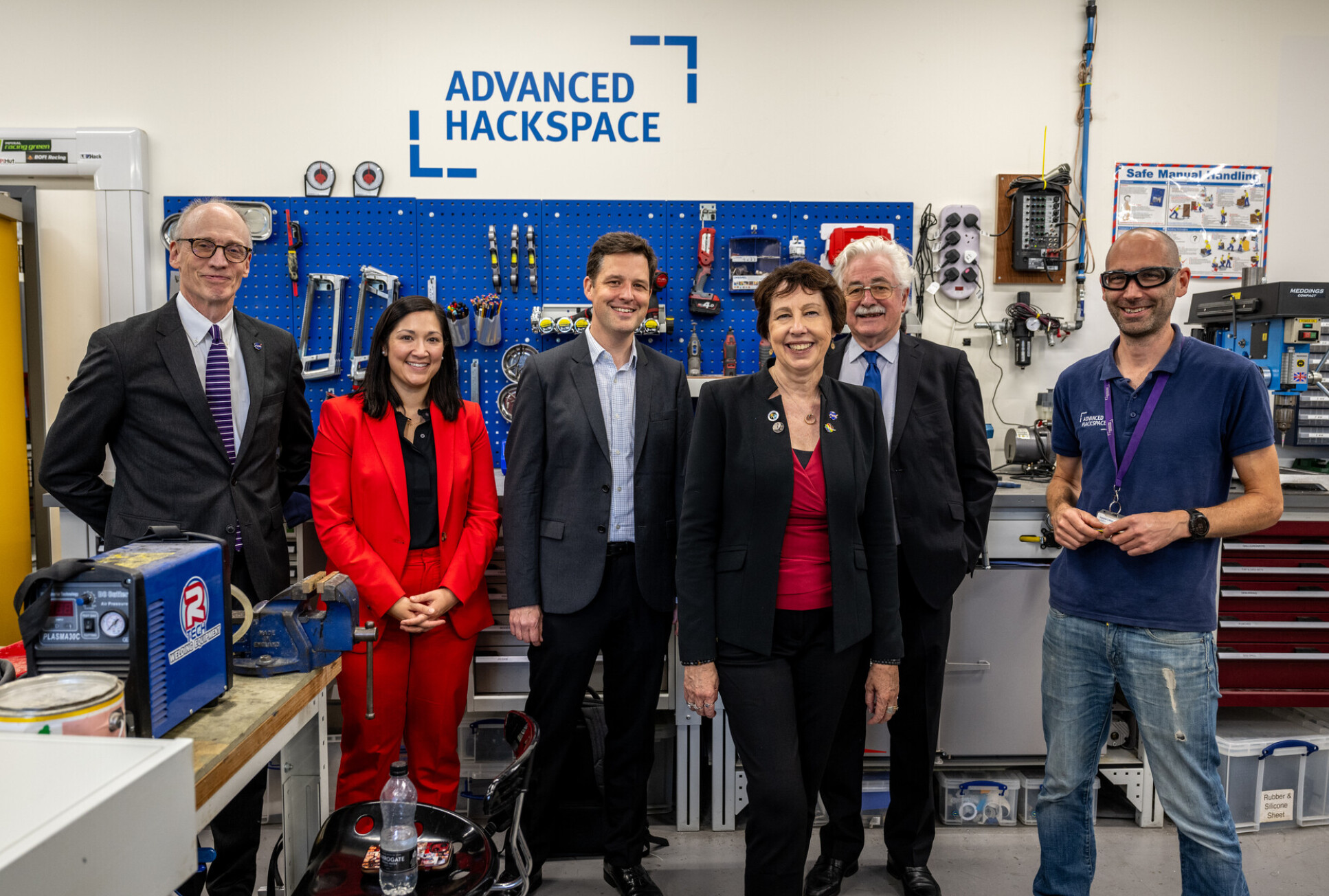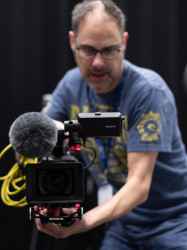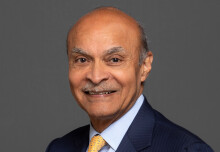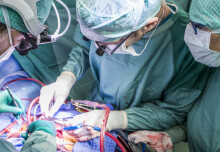We find out what NASA’s Head of Science learnt from her time at Imperial and what advice she would give to new students.
Dr Nicky Fox completed her BSc and PhD at Imperial in the Department of Physics during the 1990s. She is now Associate Administrator, NASA Science Mission Directorate, or more simply, Head of Science. In this role she oversees more than a hundred carefully chosen missions and research goals to enable a deep scientific understanding of Earth, other planets, the Sun, and the universe.
We caught up with her after a recent visit back to her alma mater, to find out about her time at Imperial, what she’s been doing since, and her advice for any students looking to follow a similar path.
What are some of your most memorable experiences from studying at Imperial?
It was such a great environment, especially during my PhD. The Space and Atmospheric Physics group was a really warm, nurturing group. Sometimes when you're doing a PhD, your research doesn't go the way you thought it would; you're having a really bad day and it's always great to have people that will just pick you up and buy you a cup of tea and make you feel better.
How did your time at Imperial help you prepare for your amazing career in space science and ultimately at NASA?
With the PhD, I had a very free rein on what I wanted to do, so I learned quickly how to form a team and a collaborative group. I ended up using a ton of very different data sets and put them all together, so that when I went to NASA as a postdoc, I already had a lot of contacts in different countries and research groups.
I have the best job on and off the planet!
When I started working as the operations scientist for a big NASA program, I had lots of reach into the community and I was very comfortable with writing out-of-the-blue emails to people saying, “hi, I need you to do this”. That I had those skills from doing my PhD really helped my first job at NASA.
How did you get from a PhD at Imperial all the way to the top of science at NASA?
I went to a conference when I was a PhD student, and I cannot stress enough how important it is to go to conferences. If you're a PhD student, always try and give a poster presentation. You think that it's much more prestigious to give a talk, but as a PhD student, you have the ability to stand in front of your poster and interact with a ton of people on a very different level than if you just give a talk.
So, I was at a meeting in Alaska and I was presenting my work and I'm standing in front of my poster very excitedly talking, and a scientist came up and chatted with me and then said, “would you be interested in applying for a postdoc at NASA?” It wasn't something I knew that I could do: I didn't know the opportunity was there, never mind the fact that I might actually be qualified. So, I did the very complicated and involved application process, sent it off and got selected. And that's how I went to NASA.
Now you oversee over a hundred science missions at NASA. What are some of the most exciting projects you're currently working on?
Coming up in October, we will have the launch of Psyche, which is also going to the asteroid called Psyche. It is an unusual asteroid because it is made mostly of metal. It's a heavy metal mission that's going to tell us about how planets formed, we think.
Of course, I'm always proud of Parker Solar Probe. It was my mission and I even have Parker Solar Probe necklace on, so it's always close to my heart. Parker Solar Probe has a sister mission called Solar Orbiter, that was a joint ESA-NASA mission, and Imperial built the magnetometer for that.
One of my favourite missions is called Helioswarm. It's got a host or hub spacecraft, and then eight little CubeSats that are going to swarm around that hub. I think it's like 156 tetrahedrons that you can form from that, so you can look at all different scale sizes of turbulence out in the solar wind. And Imperial are building all nine magnetometers for that.
Listen to Dr Fox talk about more of her favourite missions below:
In earth science, we have all these really great missions looking at air pollution, looking at hurricanes, looking at climate change, looking at how our surface water on Earth is changing. And of course, I would be remiss if I didn't mention the James Webb telescope and all the incredible images that look more like works of art. Every time I see these images, I'm like, “oh, I need a picture of that in my office” because they're just so beautiful.
I'm going to also give a shout out for all the work we do on the International Space Station. We're flying tissue chips that are living cells inside tiny mechanisms that can mimic human organs and human body functions. We're flying them up in space and doing medical research on those and also looking at how we would prepare a personalised medical kit for an astronaut that was going to go on a long journey in space.
I read somewhere that you said you have the best job in the world. What gives you that passion?
I have the best job on and off the planet! What gives me that satisfaction is it's just so exciting what we do. We also have incredible teams. NASA teams are so high performing. Everyone is really passionate and committed to the missions and you can see it every day in the way people are there for one another. It's a really supportive atmosphere.
It sounds like what you really enjoy about NASA is that it seems to be for everyone. How does it feel to be a woman in this position and what do you think we could do to encourage more to take up STEM subjects?
There are a lot of women in leadership roles at NASA, and I do think we're seeing a change in more women coming into these roles. I know that physics in particular is still a challenge, and I really think we need to be looking at our early years. Often by the time people turn 13 or 14 they've already decided physics is not for them.
I think we really need to look at what we're doing in our primary schools, to show how fun science is: science isn't hard and it isn't scary, and anyone can do science. You don't have to have a PhD to do science. If you just are curious and you like asking questions, you're actually a scientist.
What advice do you have for young people who are interested in pursuing a career in space science?
Honestly, my best piece of advice is to make sure that you do a job that you love, if you can. I don't think it matters what you do as long as you can be passionate and you can really enjoy it. So if you want to do a career in space, do it.
But you don't have to be a scientist to work in space. If I look at NASA missions, it is hard for you to throw some career at me that I couldn't find a role for you in a NASA mission or in the space program in general. We have lawyers, we have accountants, we have people that do our schedules, people that do our budgets, we have all our social media people, we have all of our graphic artists, we have people that teach, we have people that do outreach, we have scientists, we have every flavour of engineer you can possibly imagine in NASA. I’m talking about from bioengineering all the way up to planetary geology to astrobiology.
There's so many different careers that you can have in the space business, so if it's something that you're really passionate about, take the steps to find out where you could match your skill set with a job in the space sector.
You recently visited our White City campus, where we do many of these subjects. What were your highlights?
I found the visit wonderful. I have to admit, I didn't really know much about the campus until I got out there. Then to actually see the way you're creating a new kind of a new learning environment out there – I loved the Makerspace area that we went to and the iHub to see how students can get access to lab facilities, to benches, to 3D printers, to machines that will actually make parts for you.

I really think it's a very different kind of nurturing learning environment where we're not just saying, okay, we're going to stamp out physicists, but we're going to actually create scientists who are really looking at their whole self and things that they're really interested in. That's a huge step, particularly for universities to be doing something like this, I think it is really blazing a trail and I think it will inspire other universities to do it.
Do you have a message for our new students and any recommendations on making the most of their time at Imperial?
It's tough as a new student at Imperial, particularly if you come from a smaller school: you're in a big environment with a lot of very smart people. My thing I would say is if you feel like you are suffering from imposter syndrome you feel like “I just don't think I'm cut out to be here”, remember that most of your classmates are feeling exactly the same. And I felt it.
I got over it by the time I was doing my PhD, but came back when I first started at NASA: “oh my goodness, they're going to realise I shouldn't be here and I'm not clever!” Those feelings can be almost paralysing, but if you don't understand something, ask the question, don't sit there thinking everyone's going to think I'm stupid. Don't feel that you're the only person going through that; talk about it and pull together a cohort of people that you can get through this initial stage together.
Article text (excluding photos or graphics) © Imperial College London.
Photos and graphics subject to third party copyright used with permission or © Imperial College London.
Reporters
Hayley Dunning
Communications Division

Contact details
Tel: +44 (0)20 7594 2412
Email: h.dunning@imperial.ac.uk
Show all stories by this author

Martin Sayers
Communications Division

Contact details
Tel: +44 (0)20 7594 8140
Email: m.sayers@imperial.ac.uk
Show all stories by this author




Leave a comment
Your comment may be published, displaying your name as you provide it, unless you request otherwise. Your contact details will never be published.